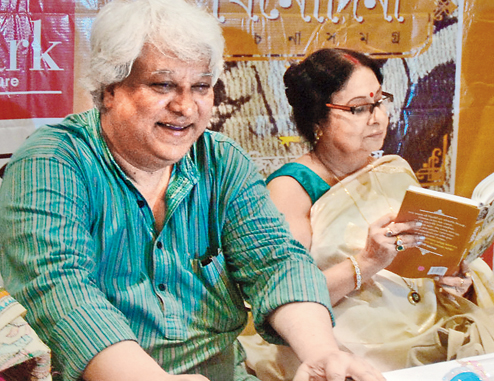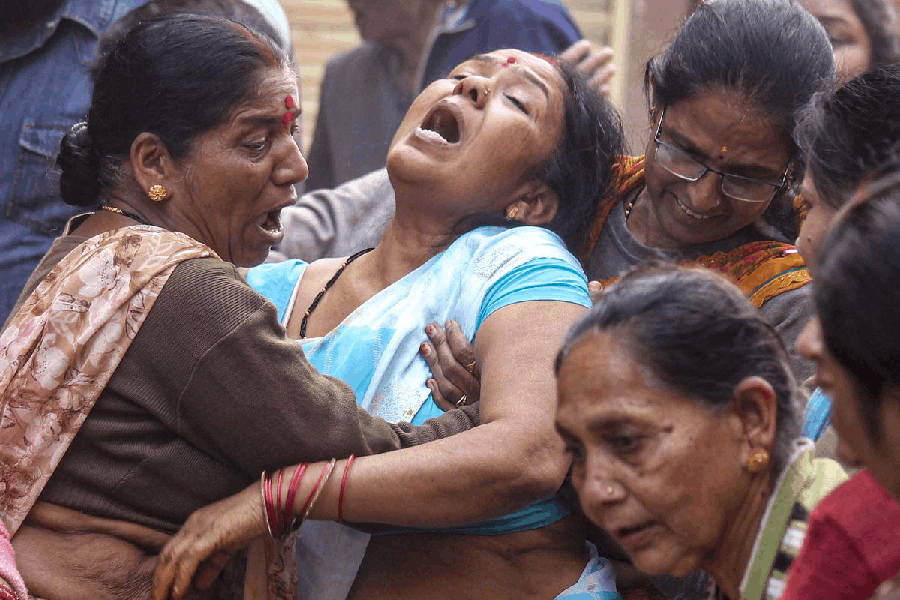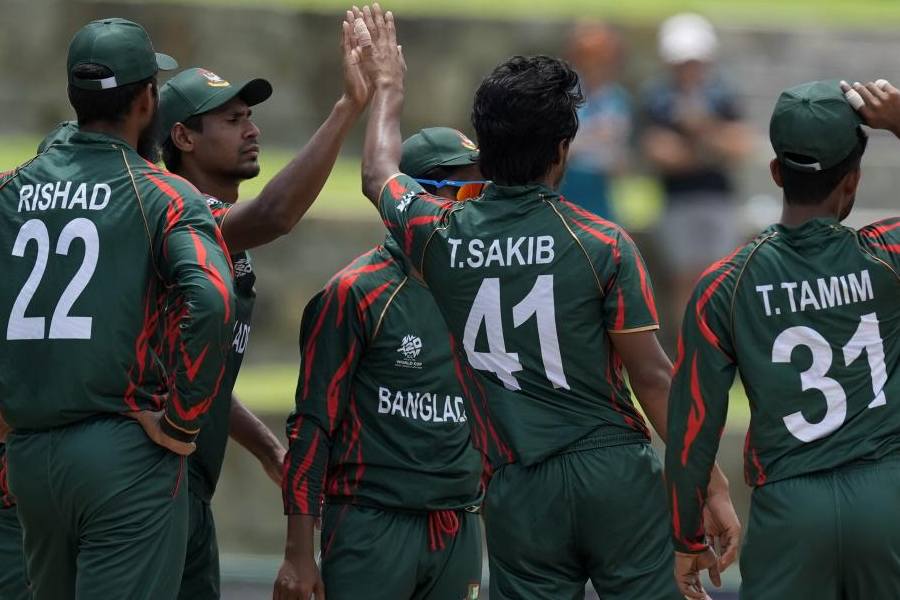 |
| Author Devajit Bandyopadhyay and Madhabi Mukherjee at the launch of Binodini Rachanasamagra at Starmark, South City and (below) Satyajit Ray’s sketch of Binodini Dasi. Picture by Bishwarup Dutta |
Binodini Dasi (1862-1941), better known as Nati Binodini, was a leading stage actress of her time, who started acting at the tender age of 12 and gave it up at 23 in spite of her enormous popularity and renown. Despite the constraints she suffered in a straitlaced and oppressive society which looked down on and ostracised actresses who were all recruited from the red light districts, Binodini is still remembered for her enthralling performances in a variety of leading roles. She was Bilasini Karphorma in the farcical Bibaha Bibhrat, Ayesha in Durgeshnandini, both Kundanandini and Suryamukhi in Bishbriksha, Uma in Agomoni, Gopa in Buddhadeb, Britannia in Palashir Juddha, Manorama and Mrinalini, and most outstandingly Chaitanya Mahaprabhu in Star theatre (which stood opposite Chhatubabu Latubabu house in Beadon Street), a turn which famously sent Ramakrishna Paramhansa into a trance.
 |
The dramatist Girish Chandra Ghosh, who was her mentor, poet Amritalal Basu, Swami Saradananda, one of the first disciples of Ramakrishna, Kalish Mukhopadhyay and Chittaranjan Ghosh had written effusively about her extraordinary talent. Yet she suffered social injustice and was forsaken by those close to her. Theatre remained her first love and till her last days she used to be a regular at theatres.
Her few extant photographs prove that she was a woman of rare dignity, aristocratic mien and beauty. Owing to the social opprobrium she faced, Binodini Dasi died a lonely woman, having lost her daughter at an early age. She was an autodidact, but that did not stop her from pouring her heart out in her autobiography, Amar Katha, which is widely read. But that was not her only work. After the death of her husband she had written books of poetry and several other pieces, all in her simple, touching style. After years of research, theatre personality Devajit Bandyopadhyay has brought out a collection of all her writings in a book titled, Binodini Rachanasamagra, and published by Patra Bharati, which was launched by actor Madhabi Mukherjee at Starmark, South City, on Wednesday evening.
Madhabi Mukherjee said words like nat and nati (actor and actress) have acquired pejorative connotations and sadly, professional theatre is dead today. No new artistes have arrived. She said she admired Devajit’s book on the visually impaired singer Krishna Chandra De, and she was sure this volume on Binodini would be equally good.
Devajit said while introducing the book that no complete and comprehensive biography exists of either Girish Ghosh or Binodini. When Binodini showed Girish her autobiography he deleted passages which he thought would offend the great and the good. After his death in 1912 the book was published with a new foreword. Hence this collection which contains all her writing save two letters published in Bharatbasi in 1882, which could not be traced. Binodini Rachanasamagra contains Amar Katha, Amar Abhinetri Jibon, her collections of poems titled Basana and Kamini Kalanka. Besides, there is a list of plays Binodini had appeared in and the time of publication of her works. Her photographs are there too, and what’s more, a sketch that Satyajit Ray had made of her. For added measure there is a CD of theatre songs.
The launch had attracted a large number of people, including scholars and theatre enthusiasts, and it ended with recitals of theatre songs of that period performed by Binodini. This time the performers were Devajit Bandyopadhyay followed by his wife Riddhi.
Global sea of women
“In all my travels what has struck me the most is the innate goodness of man,” said cardiac surgeon Saibal Gupta at the launch of his book On the Sea Shore. Krishna Bose, former parliamentarian and author, was the guest of honour and she said the book had left her wondering how a doctor could be so philosophically sound.
“The sea washes away everything and gives them back too. However, it returns only a part of what it takes and sometimes that part could be something very valuable,” she said, dwelling on the book’s title.
Also present at the launch were author Mani Shankar Mukherjee aka Shankar and film critic Swapan Mullick. Shankar lamented how Calcutta always expects its doctors to be good and nothing more. “Gupta was bitten by the literary bug in the Eighties. We are delighted he has now found the confidence to write an ode to women. People should read the book to know why no one knows human beings better than a doctor,” said Shankar.
Mullick, who has known the author for two decades, said it was a big surprise to him when Gupta tried his hand at creative writing. “This is a novel with global connections and raises a lot of complex issues,” he said.
The author, whose interest in English was kindled by Agatha Christie’s Death on the Nile, confessed that for him if there was any gain in writing the book, it was getting to meet his literary icon, Shankar. On why he chose to write on women, Gupta said he was hurt by their plight all over the world.
“There is great similarity among women across the planet. It’s like an ocean of the fairer sex, hence the inclusion of the word ‘seashore’,” he said. The book focuses on Indian women in a rapidly changing society and coming in contact with a changing world. Yet they hold on to tradition bravely. Through the protagonist Rupa’s interaction with the world, readers will get a glimpse of the psychological and scientific confusions present in today’s world.











